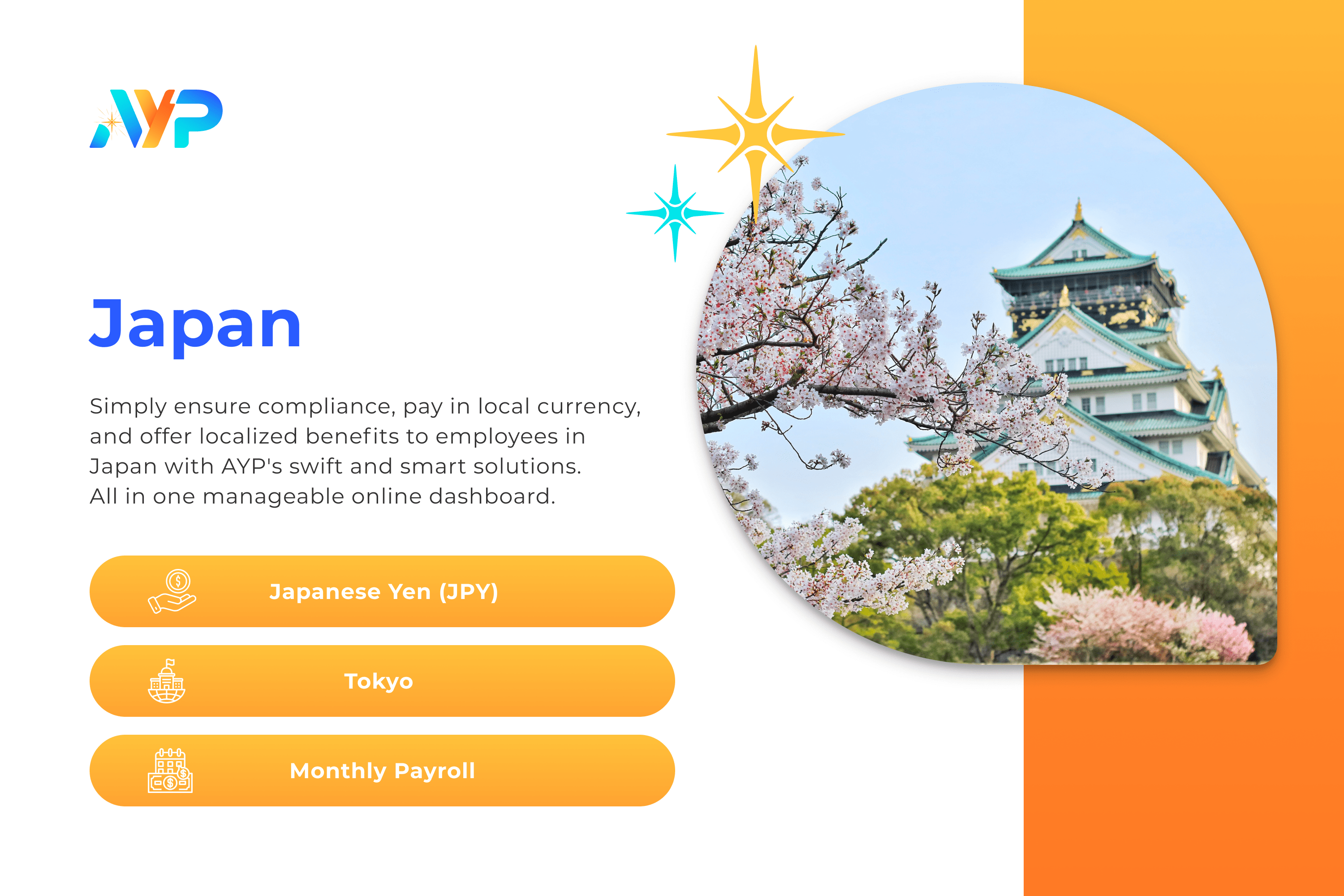What are the statutory contributions for employees and employers in Japan?
Employee Income Tax
The Japanese tax system applies a progressive tax structure which varies by location. The tax rate ranges from 5 to 45%, depending on the amount of the employee’s annual income.
Employer Payroll Contributions
Employers are required to contribute to their employees' social insurance accounts, with contribution rates varying depending on the type of insurance and the employee's salary as follows:
-
Health insurance — the employer contribution rate ranges from 4.55% to 9.15% of the employee's salary, depending on the income tier.
-
Welfare pension insurance — the employer contribution rate ranges from 8.52% to 18.3% of the employee's salary, depending on the income tier.
-
Employment insurance — the employer contribution rate ranges from 0.3% to 1.2% of the employee's salary, depending on the income tier.
Employee Payroll Contributions
Employees are required to contribute to their social insurance account with contribution rates varying depending on the type of insurance and the employee's salary as follows:
-
Health insurance — the employee contribution rate ranges from 4.8% to 9.5% of the employee's salary, depending on the income tier.
-
Welfare pension insurance — the employee contribution rate ranges from 9.15% to 18.3% of the employee's salary, depending on the income tier.
-
Employment insurance — the employee contribution rate ranges from 0.3% to 1.2% of the employee's salary, depending on the income tier.
What is the minimum wage in Japan?
Japan sets a minimum hourly wage of JPY 961 in 2023.
What is the payroll cycle in Japan?
The standard payroll cycle in Japan is monthly, with pay dates usually falling on the 25th each month.
How long is the working hours in Japan?
Full time employees customarily work 40 hours per week. If they are required to work outside of these hours, they are entitled to overtime pay. Overtime in Japan is limited to 45 hours per month and is set at a higher pay rate.
How many leaves are employees entitled to?
-
Standard paid time off — employees in Japan are entitled to at least 10 days of paid annual leave after completing six months of continuous service, with the amount of leave increasing with tenure.
-
Compulsory annual public holidays — there are 16 national public holidays in Japan.
-
Minimum paid sick leave — employees in Japan are entitled to paid sick leaves; however, the amount of leave and pay may vary depending on the employer and length of contract.
How long is the maternity and paternity leave in Japan?
-
Statutory maternity leave — female employees in Japan are entitled to up to 14 weeks of paid maternity leave.
-
Statutory paternity leave — male employees in Japan are entitled to up to 12 weeks of unpaid paternity leave.
-
Statutory parental leave — eligible employees in Japan are entitled to up to one year of unpaid leave to care for their child.
What rights do employees have upon leaving employment due to certain conditions?
Employers can terminate employees for valid reasons such as poor performance or misconduct, but this must follow a fair evaluation process. When an employee's service with a company is terminated for certain reasons, they are entitled to certain rights and benefits, including:
-
Notice period — the minimum notice period for termination varies based on the length of service, ranging from two weeks to six months.
-
Severance pay — there is no mandated severance pay in Japan, but some employers may provide it.
-
Probation period — employees can have six months of probation period at the maximum.
What is the type of visa for employees in Japan?
In order to be granted an employment visa in Japan, the applicant must have a valid job offer from an Japanese employer while the employer must obtain a Certificate of Eligibility from the Japanese Immigration Bureau on the behalf of the applicant .In addition, the applicant must meet the health and character requirements to qualify for the visa.
Japan offers a variety of employment visas, including the Specialist in Humanities/International Services visa, the Engineer/Specialist in Natural Sciences visa, and the Intra-company Transferee visa.
Standard VAT Rate
The standard VAT (known as Consumption Tax). rate in Japan is 10%.

